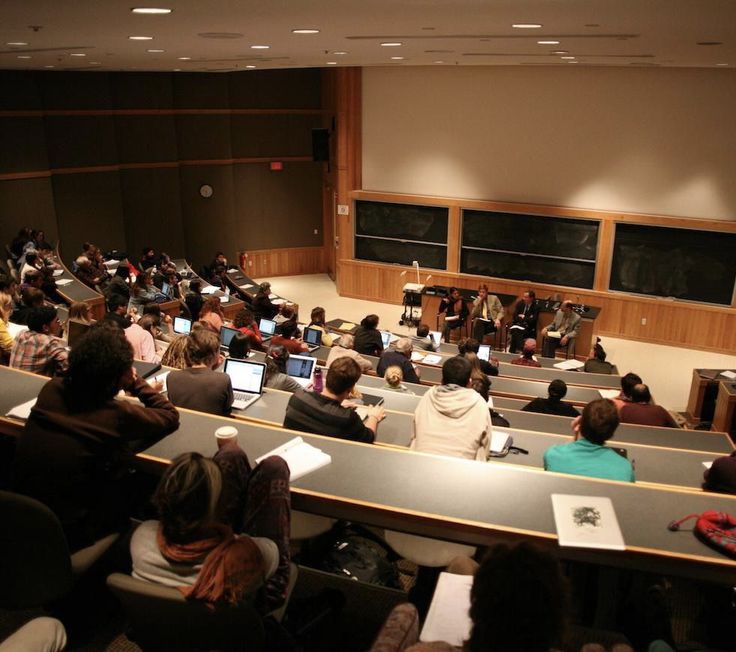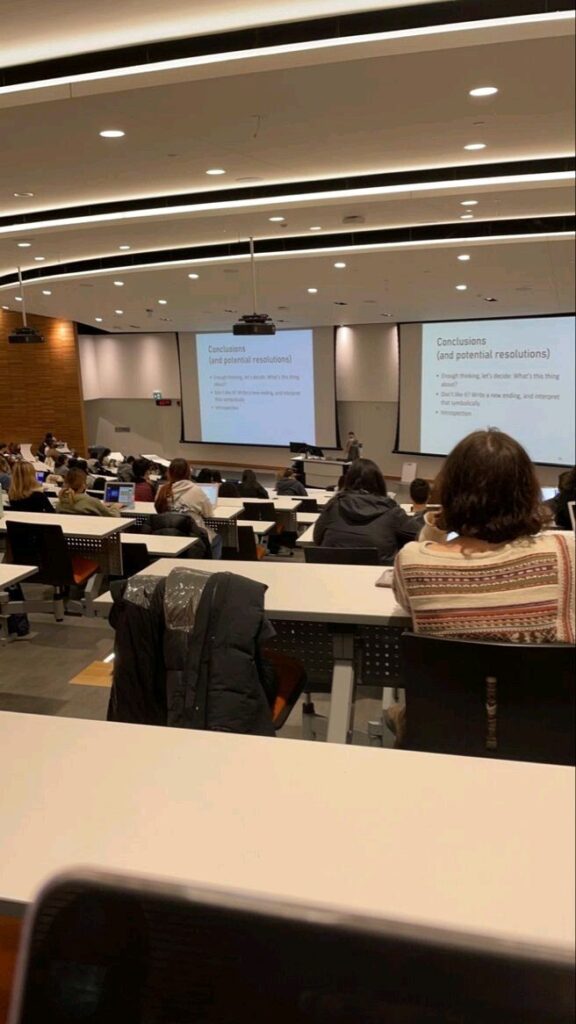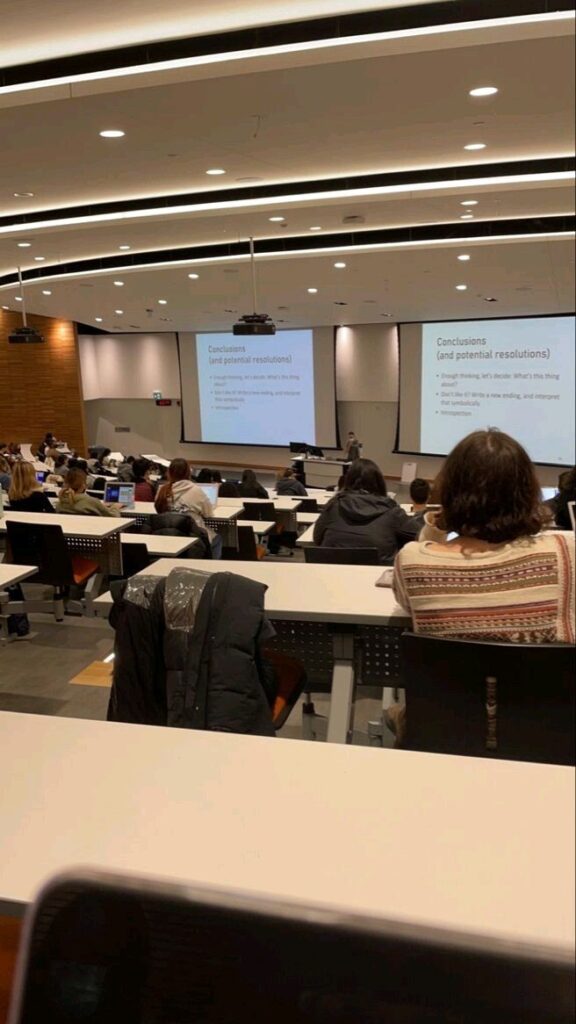Top Fields and Courses
1. Artificial Intelligence (AI) and Data Science
Popular Programs:
- Artificial Intelligence and Robotics
- Machine Learning and Deep Learning
- Data Science and Analytics
- Natural Language Processing (NLP)
Why Choose This Field?
- Transformative Career Opportunities: AI is reshaping healthcare, finance, and transportation industries.
- Be Future-Ready: Gain skills in cutting-edge technologies that are driving global innovation.
The Future with AI:
- Artificial Intelligence is no longer just a tool—it’s the future. From self-driving cars to personalized healthcare, AI is changing how we live, work, and interact with the world. You’ll be at the forefront of this revolution by studying AI-related courses, equipped to shape tomorrow’s technology and build smarter, more sustainable systems.
2. Computer Science and IT
Popular Programs:
- Cybersecurity
- Software Engineering
- Cloud Computing and DevOps
- Web and Mobile App Development
Why Choose This Field?
- Global Demand: The tech industry is booming, offering lucrative careers worldwide.
- Versatility: IT skills are applicable across every sector, from business to healthcare.
3. Business and Management
Popular Programs:
- Master of Business Administration (MBA)
- International Business
- Marketing and Digital Strategy
- Supply Chain and Logistics Management
Why Choose This Field?
- Global Demand for Leaders: Business courses prepare you for leadership roles in top organizations.
- Entrepreneurship Opportunities: Develop skills to start and manage your own company.
4. Health and Medical Sciences
Popular Programs:
- Medicine (MBBS)
- Nursing
- Public Health
- Biomedical Science
Why Choose This Field?
- Impactful Careers: Join a field dedicated to improving lives and addressing global health challenges.
- High Demand: Healthcare professionals are needed worldwide.
5. Arts, Humanities, and Social Sciences
Popular Programs:
- Media and Communication Studies
- International Relations
- Psychology
- Fine Arts and Design
Why Choose This Field?
Diverse Career Paths: Opportunities in media, education, design, and research.
Creative Expression: Nurture your creativity and critical thinking.

1. Government-Funded Scholarships
- Fulbright Foreign Student Program:
Fully funded scholarships for master’s and PhD students, covering tuition, living expenses, and travel costs. - Hubert H. Humphrey Fellowship Program:
For mid-career professionals to enhance leadership skills with a year of study and professional experience.
2. University-Specific Scholarships
- Stanford Knight-Hennessy Scholars:
Offers full funding for graduate studies across disciplines at Stanford University. - Harvard Financial Aid:
Need-based scholarships for students across undergraduate and graduate programs. - MIT Scholarships:
Generous funding for students based on merit and financial need.
3. Scholarships for STEM Students
- AAUW International Fellowships:
Scholarships for women pursuing science, technology, engineering, and mathematics studies. - Google Lime Scholarship:
Provides funding for students with disabilities in computer science and tech-related fields.
4. Other Notable Scholarships
- Joint Japan/World Bank Graduate Scholarship Program:
Funding for students from developing countries pursuing master’s degrees in development-related fields. - Civil Society Leadership Awards:
For students who demonstrate academic excellence and a commitment to social change.

How to Apply for Scholarships in the USA?
- Start Early:
Research deadlines and gather application requirements. - Prepare Strong Documents:
Craft a compelling personal statement, update your CV, and secure glowing recommendation letters. - Standardized Tests:
If applicable, ensure you meet the requirements for GRE, GMAT, TOEFL, or IELTS. - Seek Guidance:
Our expert consultants can guide you through the application process to increase your chances of success.
Why Choose H Global?
Comprehensive Support:
We help you find scholarships tailored to your field of interest and eligibility.
Fast Processing:
Our experienced team ensures your applications are completed accurately and submitted on time.
Contact us today and take the first step toward studying in the USA!
#StudyInUSA #USAScholarships2025 #ScholarshipsForInternationalStudents #HGlobal #DreamUniversity
Your Golden Opportunity for a Brighter Future
Studying in the UK is a dream for many international students, but the cost of tuition and living can be a challenge. Luckily, a wide range of scholarships is available for 2025 to help reduce or cover these expenses.
Why Choose Scholarships in the UK?
World-Class Universities:
The UK is home to some of the world’s top-ranked universities, including Oxford, Cambridge, and Imperial College London.
Diverse Scholarship Options:
Scholarships are available for various fields, from arts and humanities to engineering and medicine.
Unparalleled Educational Experience:
Studying in the UK offers advanced education systems and rich cultural exposure.

Top Scholarships Available for 2025
1. UK Government Scholarships
- Chevening Scholarship:
Fully funded scholarships for talented students and future leaders, covering tuition and living expenses. - Commonwealth Scholarships:
Designed for students from Commonwealth countries, offering full financial support.
2. University-Specific Scholarships
- Gates Cambridge Scholarship:
Prestigious funding for postgraduate students at the University of Cambridge. - Oxford Clarendon Fund:
Scholarships for international students pursuing master’s and doctoral degrees at the University of Oxford.
3. Subject-Specific Scholarships
- Women in STEM Scholarships:
This is for women pursuing degrees in science, technology, engineering, or mathematics. - MBA Scholarships:
Targeting students interested in business and management programs.
4. Regional Scholarships
- Scotland Saltire Scholarships:
This is for students who wish to study in Scotland. - International Scholarships by Wales:
Focused on students studying in Wales.
How to Apply for UK Scholarships?
- Research Thoroughly:
Explore universities and official government scholarship websites. - Prepare Your Documents:
Get your personal statement, CV, recommendation letters, and academic transcripts ready. - Meet Deadlines:
Keep track of application submission dates. - Seek Professional Guidance:
Our team is here to help you find the best scholarships and prepare your applications effectively.
Why Choose H Global?
Expert Guidance:
Our consultants help you identify the most suitable scholarships for your goals.
Fast and Accurate Processing:
We ensure your applications are submitted quickly and flawlessly.
Contact us today to begin your journey!
#StudyInUK #UKScholarships2025 #HGlobal #DreamUniversity
In today’s world, pursuing higher education often comes with a hefty price tag. However, scholarships offer a pathway to realizing academic dreams without the burden of excessive financial strain. From merit-based awards to need-based assistance, scholarships come in various forms and are available for students across diverse fields of study. This article serves as a comprehensive guide to understanding scholarships and navigating the application process.
Types of Scholarships:
- Merit-Based Scholarships: Merit-based scholarships are awarded to students based on their academic achievements, extracurricular activities, leadership potential, and other criteria. These scholarships recognize excellence and provide support to students who demonstrate exceptional academic performance and potential for success. Merit-based scholarships are often offered by universities, private organizations, and government agencies.
- Need-Based Scholarships: Need-based scholarships are awarded to students based on financial need. These scholarships aim to make higher education more accessible to students from low-income backgrounds by providing financial assistance to cover tuition fees, living expenses, and other educational costs. Need-based scholarships may be offered by universities, nonprofit organizations, philanthropic foundations, and government agencies.
- Athletic Scholarships: Athletic scholarships are awarded to student-athletes who excel in sports such as basketball, football, soccer, tennis, and track and field. These scholarships are typically offered by universities and colleges with competitive sports programs. Athletic scholarships provide financial assistance to student-athletes in exchange for their participation in collegiate sports teams.
- Diversity Scholarships: Diversity scholarships are awarded to students from underrepresented or marginalized communities, including racial and ethnic minorities, LGBTQ+ individuals, first-generation college students, and students with disabilities. These scholarships aim to promote diversity, equity, and inclusion in higher education by providing support to students from diverse backgrounds.
- Study-Specific Scholarships: Study-specific scholarships are awarded to students pursuing specific fields of study or academic disciplines. These scholarships may be tailored to students studying STEM (science, technology, engineering, and mathematics), humanities, social sciences, arts, business, healthcare, and other areas. Study-specific scholarships may be offered by universities, professional organizations, industry associations, and government agencies.
Navigating the Scholarship Application Process:
- Research: Begin by researching scholarship opportunities that align with your academic interests, background, and financial needs. Utilize online scholarship databases, university websites, and financial aid offices to identify potential scholarships.
- Meet Eligibility Criteria: Carefully review the eligibility criteria for each scholarship to ensure that you meet the requirements. Pay attention to GPA requirements, standardized test scores, extracurricular activities, and any other specific criteria outlined by the scholarship provider.
- Prepare Application Materials: Gather the necessary documents and materials required for the scholarship application, including transcripts, letters of recommendation, personal statements, and essays. Tailor your application materials to highlight your achievements, experiences, and aspirations.
- Submit Applications: Submit your scholarship applications by the specified deadlines, ensuring that all required materials are complete and accurate. Double-check your application submissions to avoid errors or omissions that could jeopardize your chances of receiving the scholarship.
- Follow Up: After submitting your scholarship applications, follow up with the scholarship providers to confirm receipt of your application materials and inquire about the status of your application. Be proactive in seeking feedback and clarification if needed.
Conclusion: Scholarships provide invaluable opportunities for aspiring students to pursue higher education and achieve their academic goals. By understanding the different types of scholarships available and navigating the application process effectively, students can unlock a world of opportunities and embark on a journey of academic success and personal growth.
For many students, studying abroad is not just about academics; it’s also a transformative social experience. From forging lifelong friendships to immersing oneself in new cultures, the social aspect of studying abroad plays a pivotal role in shaping one’s personal growth and enriching the overall educational journey. This article explores the dynamic and diverse social life of students abroad, highlighting the opportunities for connection, cultural exchange, and personal enrichment.
Cultural Exchange and Diversity: One of the most enriching aspects of studying abroad is the opportunity to interact with individuals from diverse backgrounds and cultures. Whether through international student clubs, cultural events, or shared living spaces, students abroad are constantly exposed to new perspectives, traditions, and customs. This cultural exchange fosters mutual understanding, tolerance, and appreciation for the richness of human diversity, broadening students’ horizons and challenging their preconceptions.
Friendship and Community: Building meaningful connections and friendships is a cornerstone of the social experience abroad. From orientation activities to extracurricular clubs and sports teams, students have ample opportunities to meet like-minded individuals and form bonds that transcend geographical boundaries. These friendships often extend beyond the classroom, as students explore new cities together, share meals, celebrate festivals, and support each other through the highs and lows of the academic journey.
Language and Communication: Studying abroad provides a unique opportunity for language acquisition and cross-cultural communication. Whether students are learning a new language or honing their existing language skills, immersion in a foreign environment offers a rich and immersive learning experience. From navigating everyday interactions to engaging in academic discussions, students develop confidence and fluency in their target language, enhancing their communication skills and cultural competence.
Social Events and Activities: Universities and colleges abroad offer a plethora of social events and activities designed to foster community engagement and student involvement. From welcome receptions and international nights to music festivals and sports tournaments, there’s always something happening on campus or in the local community. These events provide opportunities for students to socialize, network, and create lasting memories, adding vibrancy and excitement to their overall study abroad experience.

Exploring the Host Country: Beyond campus life, studying abroad offers students the chance to explore and experience the host country’s culture, history, and landmarks. Whether it’s visiting museums, attending cultural festivals, or exploring scenic landscapes, students have the opportunity to immerse themselves fully in their new surroundings. These adventures not only provide valuable insights into the host country’s culture and heritage but also foster a sense of curiosity, adventure, and openness to new experiences.
Challenges and Growth: While studying abroad can be exhilarating, it also comes with its share of challenges, including homesickness, cultural adjustment, and language barriers. However, overcoming these obstacles fosters resilience, adaptability, and personal growth. Through shared experiences, mutual support, and the guidance of mentors and advisors, students develop valuable life skills and a deeper understanding of themselves and the world around them.
Conclusion: The social life of students abroad is a vibrant tapestry of friendship, cultural exchange, and personal growth. From forging connections with peers from around the world to exploring new cultures and experiences, studying abroad offers a transformative journey that extends far beyond the classroom. By embracing the global community and immersing themselves fully in the social fabric of their host country, students enrich their lives, broaden their perspectives, and create memories that last a lifetime.
The United Kingdom is home to some of the world’s most prestigious and diverse universities, attracting thousands of international students each year. From bustling cities to picturesque campuses, the UK offers a rich tapestry of academic experiences. This article provides a comprehensive guide to the best UK universities for international students, including those in Hertfordshire, Lancaster, Huddersfield, East London, Birmingham, UCL, Solent, Nottingham, Sheffield, and Manchester.
University of Hertfordshire: Located in the picturesque county of Hertfordshire, this modern university offers a vibrant and supportive environment for international students. With a strong focus on employability and industry connections, the University of Hertfordshire provides a range of undergraduate and postgraduate programs in fields such as business, engineering, computer science, and the arts.

Lancaster University: Nestled in the historic city of Lancaster, this prestigious institution is renowned for its excellence in research and teaching. Lancaster University offers a wide range of programs across disciplines including science, social sciences, humanities, and management. International students benefit from a diverse community, state-of-the-art facilities, and opportunities for global engagement.
University of Huddersfield: Located in the heart of Yorkshire, the University of Huddersfield prides itself on its innovative approach to education and strong industry links. International students can choose from a variety of undergraduate and postgraduate programs, including courses in business, engineering, health sciences, and the creative arts. The university’s supportive environment and focus on employability make it an attractive destination for students from around the world.
University of East London (UEL): Situated in the dynamic city of London, UEL offers a truly multicultural and cosmopolitan learning experience. With its diverse student body and vibrant campus life, UEL provides a range of undergraduate, postgraduate, and research opportunities across disciplines such as business, law, psychology, and the social sciences. International students benefit from the university’s central location and strong industry connections.
University of Birmingham: As one of the leading research universities in the UK, the University of Birmingham offers a world-class education in a historic and vibrant setting. International students can choose from a wide range of programs in areas including medicine, engineering, humanities, and social sciences. With its strong focus on research and innovation, Birmingham provides students with opportunities to engage with cutting-edge research and global challenges.
University College London (UCL): Ranked among the top universities in the world, UCL offers a prestigious and intellectually stimulating environment for international students. With its central location in the heart of London, UCL provides a diverse range of undergraduate, postgraduate, and research programs across disciplines such as science, engineering, arts, and humanities. International students benefit from UCL’s rich academic heritage, world-class facilities, and global network of alumni.
Solent University: Located in the vibrant coastal city of Southampton, Solent University offers a range of innovative and career-focused programs for international students. With its strong links to industry and emphasis on practical learning, Solent provides opportunities for students to gain real-world experience and develop employability skills. Programs in areas such as maritime studies, media, business, and engineering are particularly popular among international students.
University of Nottingham: With campuses in Nottingham, Malaysia, and China, the University of Nottingham offers a truly global education experience. International students can choose from a wide range of programs across disciplines such as science, engineering, business, humanities, and the arts. Nottingham’s strong research culture, supportive community, and global outlook make it a popular choice for students seeking a world-class education.
University of Sheffield: Renowned for its excellence in teaching and research, the University of Sheffield offers a diverse and inclusive learning environment for international students. With its strong emphasis on employability and student support, Sheffield provides a range of undergraduate and postgraduate programs in fields such as science, engineering, social sciences, and the arts. The university’s central location and vibrant student life make it an attractive destination for students from around the world.
University of Manchester: As one of the largest and most prestigious universities in the UK, the University of Manchester offers a wealth of opportunities for international students. With its diverse student body, world-class facilities, and vibrant campus culture, Manchester provides a range of undergraduate, postgraduate, and research programs across disciplines such as science, engineering, humanities, and social sciences. International students benefit from Manchester’s reputation for excellence and its strong connections to industry and academia.
Conclusion: Choosing the right university is a crucial decision for international students seeking to pursue higher education in the UK. The universities highlighted in this guide, including those in Hertfordshire, Lancaster, Huddersfield, East London, Birmingham, UCL, Solent, Nottingham, Sheffield, and Manchester, offer a diverse range of programs, vibrant campus communities, and world-class facilities. Whether students are drawn to research-intensive institutions or those with a strong focus on employability, these universities provide opportunities for academic excellence, personal growth, and global engagement.
The United States has long been renowned for its diverse and dynamic higher education landscape, attracting students from around the globe with its myriad of academic offerings. One of the remarkable facets of applying to U.S. universities is the vast array of subjects and disciplines available to prospective students. This article delves into the rich tapestry of academic opportunities awaiting students who choose to pursue higher education in the United States.
The Multifaceted Academic Spectrum: One of the most appealing aspects of U.S. universities is the breadth and depth of academic disciplines they offer. From traditional fields like engineering, medicine, and business to emerging areas such as data science, sustainability studies, and artificial intelligence, students have an unparalleled array of subjects to explore. This diversity enables individuals to pursue their passions and carve out unique educational pathways tailored to their interests and career aspirations.

Flexibility and Interdisciplinary Studies: U.S. universities are known for their flexible academic structures, allowing students to design customized course schedules and pursue interdisciplinary studies. Many institutions offer programs that blend multiple disciplines, fostering innovation and cross-pollination of ideas. Whether it’s combining computer science with psychology, environmental studies with economics, or music with technology, students have the freedom to create interdisciplinary trajectories that reflect the complexities of real-world challenges.
STEM Fields: Science, Technology, Engineering, and Mathematics: The United States boasts some of the world’s leading institutions in STEM fields, renowned for their cutting-edge research, state-of-the-art facilities, and industry partnerships. Students interested in STEM disciplines have access to a wealth of resources, including laboratory facilities, research opportunities, and mentorship programs. Whether it’s exploring the frontiers of space exploration, unraveling the mysteries of the human genome, or developing innovative solutions to environmental challenges, the possibilities are limitless in STEM fields.
Humanities, Arts, and Social Sciences: Beyond STEM, U.S. universities offer a vibrant landscape for students interested in humanities, arts, and social sciences. From literature and philosophy to anthropology and political science, these disciplines provide a deeper understanding of human culture, society, and history. Students have the opportunity to engage with diverse perspectives, critical thinking, and creative expression, enriching their intellectual growth and fostering a deeper appreciation for the complexities of the human experience.
Professional and Applied Fields: For students seeking practical skills and professional training, U.S. universities offer a wide range of programs in applied fields such as business, law, healthcare, and education. Whether it’s pursuing an MBA at a top business school, attending a prestigious law program, or obtaining a degree in nursing or education, students can access world-class training and resources to prepare for their chosen careers. Internship opportunities, experiential learning, and industry partnerships further enhance the practical relevance of these programs.
Conclusion: The diversity of academic opportunities available to students applying to U.S. universities underscores the country’s reputation as a global hub for higher education and innovation. Whether students are drawn to STEM fields, humanities, arts, or professional disciplines, they can find institutions that cater to their interests and aspirations. As students embark on their educational journeys, they have the opportunity to explore, discover, and shape their futures in a dynamic and ever-evolving academic landscape.
Navigating UK student accommodation options requires careful consideration of factors such as location, budget, and lifestyle preferences. Whether you choose to live in university halls of residence, private student housing, or a homestay, it’s essential to research your options thoroughly and plan to secure accommodation that meets your needs. By exploring the diverse range of accommodation options available in the UK and leveraging available resources and support services, students can create a comfortable and enriching living environment that enhances their educational experience.
For students embarking on their educational journey in the United Kingdom, finding suitable accommodation is a crucial step towards creating a comfortable and conducive living environment. With a plethora of options available, ranging from university halls of residence to private rentals, navigating the UK’s student housing landscape can seem daunting. In this comprehensive guide, we’ll explore the various accommodation options available to students in the UK and provide valuable insights to help you make informed decisions.

University Halls of Residence
Many UK universities offer on-campus accommodation in the form of halls of residence. These purpose-built student accommodations provide a convenient and supportive living environment, often located within walking distance of campus facilities. Halls of residence typically offer a range of room types, from single en-suite rooms to shared apartments, catering to different preferences and budgets. Living in university halls provides students with opportunities to socialize, participate in organized events, and access on-site amenities such as laundry facilities and common areas.
Private Student Housing For those seeking more independence and flexibility, private student housing is another popular option. Private accommodations come in various forms, including studio apartments, shared flats, and student houses. They are often located in close proximity.
to university campuses and offer amenities such as furnished rooms, communal spaces, and internet access. Renting privately allows students to tailor their living arrangements to their preferences and budgets, but it’s essential to research landlords, contracts, and local regulations thoroughly before committing to a rental agreement.
Homestays
Homestay arrangements offer students the opportunity to live with a local host family, providing a unique cultural experience and a supportive living environment. Host families typically offer furnished rooms and meals, creating a home away from home for international students. Living in a homestay allows students to immerse themselves in British culture, practice their language skills, and receive personalized support from their host family. It’s essential to communicate expectations and preferences with your host family to ensure a comfortable and enjoyable experience.
Budgeting and Financial Considerations
When considering accommodation options, it’s crucial to factor in costs beyond rent, such as utilities, transportation, and groceries. University halls of residence often include utilities in the rental fee, while private accommodations may require students to budget separately for electricity, water, and internet. Additionally, students should explore financial aid options, scholarships, and student discounts to help offset living expenses and make informed decisions about their accommodation budget.
Navigating UK student accommodation options requires careful consideration of factors such as location, budget, and lifestyle preferences. Whether you choose to live in university halls of residence, private student housing, or a homestay, it’s essential to research your options thoroughly and plan to secure accommodation that meets your needs. By exploring the diverse range of accommodation options available in the UK and leveraging available resources and support services, students can create a comfortable and enriching living environment that enhances their educational experience.
For students embarking on their educational journey in the United Kingdom, finding suitable accommodation is a crucial step towards creating a comfortable and conducive living environment. With a plethora of options available, ranging from university halls of residence to private rentals, navigating the UK’s student housing landscape can seem daunting. In this comprehensive guide, we’ll explore the various accommodation options available to students in the UK and provide valuable insights to help you make informed decisions.
University Halls of Residence
Many UK universities offer on-campus accommodation in the form of halls of residence. These purpose-built student accommodations provide a convenient and supportive living environment, often located within walking distance of campus facilities. Halls of residence typically offer a range of room types, from single en-suite rooms to shared apartments, catering to different preferences and budgets. Living in university halls provides students with opportunities to socialize, participate in organized events, and access on-site amenities such as laundry facilities and common areas.
Private Student Housing
For those seeking more independence and flexibility, private student housing is another popular option. Private accommodations come in various forms, including studio apartments, shared flats, and student houses. They are often located in close proximity to university campuses and offer amenities such as furnished rooms, communal spaces, and internet access. Renting privately allows students to tailor their living arrangements to their preferences and budgets, but it’s essential to research landlords, contracts, and local regulations thoroughly before committing to a rental agreement.
Homestays
Homestay arrangements offer students the opportunity to live with a local host family, providing a unique cultural experience and a supportive living environment. Host families typically offer furnished rooms and meals, creating a home away from home for international students. Living in a homestay allows students to immerse themselves in British culture, practice their language skills, and receive personalized support from their host family. It’s essential to communicate expectations and preferences with your host family to ensure a comfortable and enjoyable experience.
Budgeting and Financial Considerations
When considering accommodation options, it’s crucial to factor in costs beyond rent, such as utilities, transportation, and groceries. University halls of residence often include utilities in the rental fee, while private accommodations may require students to budget separately for electricity, water, and internet. Additionally, students should explore financial aid options, scholarships, and student discounts to help offset living expenses and make informed decisions about their accommodation budget.
Steps to Follow After Receiving a Conditional Offer
Congratulations on receiving your conditional offer! Here’s what you need to do next:
- Understand Your Conditions: Carefully read your offer letter to understand the specific conditions you need to meet. This could include achieving specific grades, providing proof of English proficiency, or submitting additional documents.
- Prepare Necessary Documents: Start gathering all the required documents. This may include your academic transcripts, certificates, reference letters, and any other documents specified in your offer.
- Meet the Conditions: Focus on meeting the conditions outlined in your offer. If it involves achieving certain grades, prioritize your studies and aim to meet or exceed the required marks.
- Submit Required Documents: Once you have met the conditions, submit the required documents to the university as soon as possible. Ensure all documents are complete and correctly formatted to avoid any delays.
- Confirm Your Acceptance: Inform the university that you accept the conditional offer. Follow their instructions to confirm your place.

- Apply for Visa (if applicable): If you are an international student, begin the visa application process. Ensure you have all the necessary documents and meet the visa requirements.
- Plan Your Finances: Arrange for tuition fees, living expenses, and other financial requirements. Look into scholarships, financial aid, and other funding options.
- Prepare for Your Move: Start planning your accommodation, travel, and other logistics. Research the local area and prepare for life in a new country or city.
- Stay in Touch: Keep in contact with the university and stay updated on any further requirements or information they may send.
By following these steps, you’ll be well on your way to fulfilling the conditions of your offer and starting your academic journey! If you need any assistance, don’t hesitate to reach out to us.
